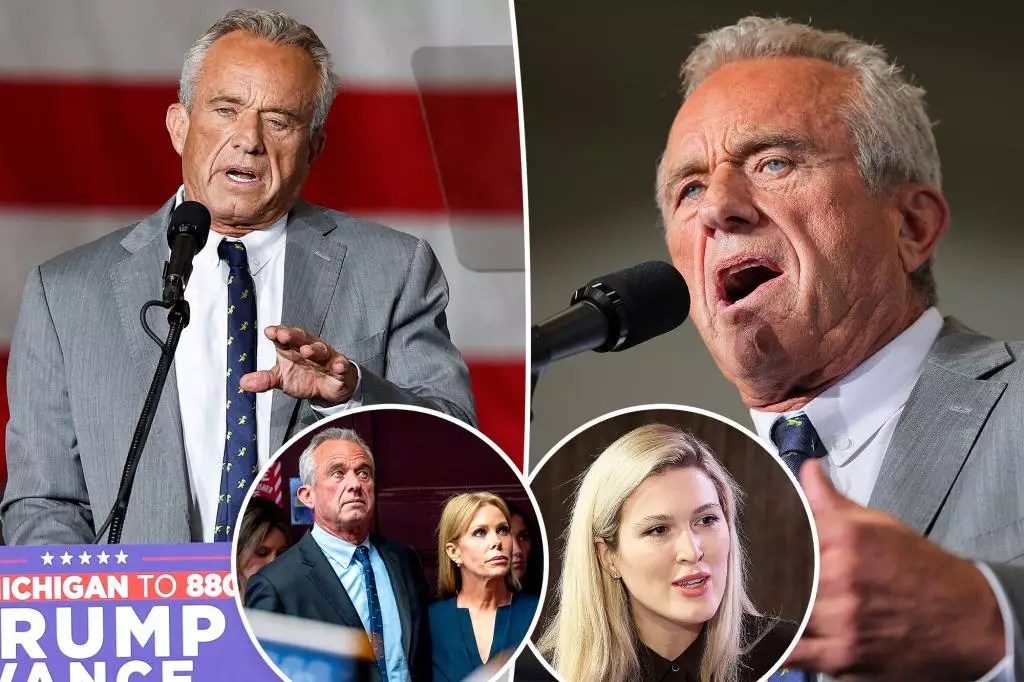Robert F. Kennedy Jr., the son of the late Robert F. Kennedy and nephew of President John F. Kennedy, has been a significant figure in American political and health discussions. Recently, he found himself embroiled in a sexting scandal involving Olivia Nuzzi, a writer for New York Magazine, which has thrown his public persona into question. Despite this controversy, Kennedy appeared unfazed and continued to engage in public discussions about nutrition and health at a Senate roundtable, demonstrating his complex relationship with the media and public perception.
During the roundtable discussion titled “American Health and Nutrition: A Second Opinion,” organized by Senator Ron Johnson from Wisconsin, Kennedy maintained a commendably professional demeanor. This panel included notables like Jillian Michaels, known for “The Biggest Loser,” and Dr. Jordan B. Peterson, a well-known clinical psychologist and author. Observers noted that Kennedy seemed relaxed and engaged, despite the unwanted spotlight from his personal life. His choice to wear his wedding ring publicly while facing allegations paints a picture of a man trying to uphold his commitments while simultaneously addressing significant public health issues.
Kennedy’s ability to navigate the dual pressures of public scrutiny and professional responsibility is noteworthy. Having been a vocal critic of the mainstream food industry, he leveraged his platform to address the rampant issues of corporate influence over nutrition and health regulations in the United States. His participation in discussions surrounding these critical issues suggests he wishes to tailor the narrative away from personal distractions towards more substantial societal matters.
The crux of Kennedy’s message lies in his criticisms of ultra-processed foods and the toxic chemicals that he argues are the root causes of declining American health. His controversial statements about obesity evoke historical perspectives that challenge conventional understanding. When Kennedy remarked that being overweight was once so rare that it sparked public curiosity, he aimed to underscore how drastically societal norms have shifted over the last century due to changes in food production and consumption patterns.
Kennedy’s endorsement of Donald Trump following his suspension from the presidential race indicates a strategic pivot aimed at broadening his political influence. He declared a desire for a president who would actively promote better health policies, thereby aligning himself with an audience disillusioned with the complexities of current dietary standards.
In various interviews, including one with Fox News, Kennedy has emphatically criticized governmental organizations such as the USDA and FDA, accusing them of being “captured” by the very industries they should regulate. This perspective contributes to a broader narrative of distrust in governmental oversight, which resonates with numerous Americans who feel neglected by regulatory frameworks that do not seem to prioritize public health.
Kennedy’s rhetoric challenges current food laws and reflects a deeply rooted cynicism towards institutions that many believe should act in the public’s interest. His assertions about the inaccuracy of food labeling and the risks of contaminated supply chains spotlight real concerns that reflect a widespread appetite for reform in food policy.
Regardless of his controversies, Robert F. Kennedy Jr. remains a significant figure in discussions about health and nutrition. His ability to articulate the flaws in the current food system while managing personal scrutiny reflects a duality that many public figures encounter. While his personal life continues to evolve in the public eye, his commitment to advocating for American health indicates a focused mission that may transcend the momentary distractions of scandal.
As the political landscape evolves, Kennedy’s insights into food regulatory capture and public health suggest that he intends to stay relevant in the fight against poor dietary practices. His ability to balance personal and professional commitments moving forward will likely continue to shape perceptions and discussions about health in America. Whether he can sustain his influence amid ongoing controversies remains an open question, but his passion for food advocacy is undeniably evident.


Leave a Reply